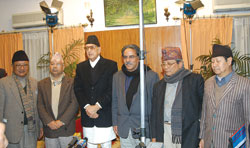|
|
| MAKING AMENDS: (l-r) NC-D\'s Gopal Man Shrestha, UML\'s Madhab Kumar Nepal, Prime Minister Girija Prasad Koirala, Maoist Chairman Puspa Kamal Dahal, Deputy Prime Minister Amik Sherchan, and Nepal Workers and Peasant Party\'s Narayan Man Bijuckhe stand together after Koirala\'s address to the nation following an eight-party meeting on the tarai situation on Wednesday night. |
One wonders what the government must do before the Madhesi Janadhikar Forum (MJF) comes forward for dialogue. Upendra Yadav's group resolutely refused to talk until Home Minister Krishna Sitaula was fired. The MJF has also demanded that Nepal be declared a federal republic, and that electoral constituencies be redrawn on the basis of population.
After marathon sessions at Baluwatar with his allies, Prime Minister Koirala put on a sober face Wednesday night (pictured) and said what he had failed to say the first time round: sorry for the deaths, we shall compensate the victims, your grievances are genuine and we shall meet your legitimate demands. Then he spelt out the eight parties' commitment to a federal government, and promised that electoral constituencies would be redrawn to give the tarai 49 percent of parliamentary seats. Exactly how these will be done remains to be negotiated.
Whether this is seen by madhesi protestors as enough of a climbdown by a haughty pahadi-dominated government, we shall see in due course. But the more important point is that momentous political declarations have a way of separating the moderates from the radicals. Something like that is likely now.
The first indications from the tarai are that most moderate madhesi leaders and politicians, though not fully satisfied, are leaning towards accepting Koirala's concessions. One prominent madhesi journalist told me by phone: "the prime minister could have gone further, but we think what he said is good enough. The fight will move off the streets and into parliament and negotiations committees."
Another madhesi civil society leader said Kathmandu's concessions could split the madhesis because there will always be some who are unsatisfied. "The onus is now on the MJF. We all want to see whether it truly represents the broad sentiments of the madhes or is just another spoiler," he says.
The MJF can keep fighting if it wants to, since Koirala did not fire his Home Minister Krishna Prasad Sitaula. But Upendra Yadav and his MJF will be missing a critical point if they continue to refuse talks: With each day's delay in dialogue, they become as much responsible as the police for the needless deaths in the tarai. At least 15 lives could have been saved in the past two weeks if Yadav had only talked.
Having said that, are Yadav and the MJF the true interlocutors of the madhes? Let's hear madhesis themselves answer this question. With all due respect for the MJF, it must be said that the slogans it is raising today were first raised by Nepal Sadbhavana Party, back in 1990. The truth is, the MJF happened to be in the right place at the right time by one of those quirky accidents of history. There is no question about the legitimacy of madhesi grievances, but there are many questions about whether the MJF really represents all the tarai constituencies. It would be a travesty, then, if the government focussed all its negotiating energies on the MJF alone.
There will be talks, eventually. But should the table be occupied by only the government and madhesi groups? What about the pahadis who have lived in the madhes for years? Should they not get a seat at the table? History's lessons have shown that excluding groups whose fates are decided by others inevitably leads to future conflicts. If the madhesi leadership is wise, it will reach out to tarai pahadis now.
And of course, since any dialogue will resolve around questions of identity, exclusion, representation, federation, and affirmative action, it would be equally wise to invite representative janajati, dalit, women and every other marginalised group in the nation to the dialogue table. All these groups are demanding the same fundamental things.
If Peace Process II has to happen-and it must-let it happen in its entirety.




